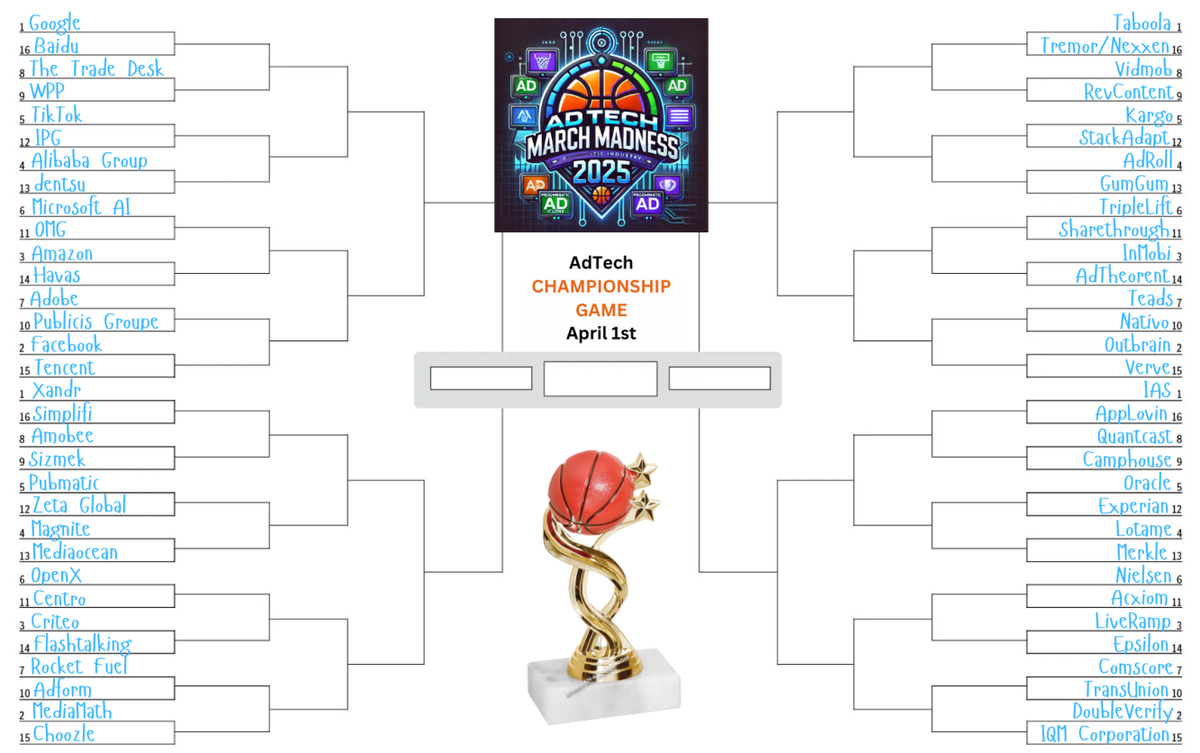"You got peanut butter in my chocolate."
H.B. Reese's decision to put peanut butter inside chocolate more than a century ago was perhaps one of the greatest consumer marketing innovations
of all time, and now there is a B2B marketing stunt mashing ad tech up with the NCAA's "March Madness" college hoops tournament. Sort of.
Late last week, ad tech marketing consultant (and
former MediaPost marketing czar) Rob McEvily launched "AdTech March Madness" -- an AI-generated version of the college
basketball playoffs featuring ad-tech industry companies and their star "players" -- on LinkedIn, and it has been blowing up within the B2B sector.

Somehow, Team MediaPost -- including a virtual version of this writer -- made it into these unusual
playoffs and we actually won the first heat (against Smart Cookies), although we lost our second round (60 to 88) against Nexxen.
advertisement
advertisement
While the lineups and categorizations were curated humanly by
McEvily, the outcomes were all AI, thanks to some expert prompts from McEvily, who used ChatGPT to determine how various ad tech (and at least one trade publisher) would fare in a virtual "March
Madness" competition based on key staffers.
McEvily says that while the AI application was done seriously and as scientifically as he could muster it, the goal of the tournament was to have
fun and draw attention -- and a bit of LinkedIn virality -- to the industry.
Asked how what criteria ChatGPT used to determine the outcome of the basketball-less competition, McEvily provided
the chatbot's response here:
The team rankings within each conference were based on a combination of the following factors:
1.
Company Size & Market Cap
- Larger companies with higher revenues, valuations, and market influence were ranked higher.
- For
example, Alphabet (Google), Meta, and Amazon Advertising naturally took top spots in the Global Giants Conference due to their dominant positions
in digital advertising.
2. Industry Impact & Innovation
- Companies leading in technological advancements, acquisitions, and
disruptive innovation were ranked higher.
- Example: The Trade Desk ranked highly in Programmatic Powerhouses because of its
industry-leading demand-side platform (DSP).
3. Brand Recognition & Influence
- Companies with strong brand authority and
presence in ad tech media, conferences, and thought leadership earned higher seeds.
- Example: Mediaocean and Criteo were
ranked as major players in Programmatic Powerhouses due to their long-standing industry presence.
4. Market Momentum &
Growth
- Emerging companies that have seen recent growth, IPOs, or funding rounds were ranked higher in Emerging
Innovators and Specialized Solutions Conferences.
- Example: VidMob replaced Bidtellect due to its rapid expansion in AI-powered
creative optimization.
5. Competitive Positioning & Niche Strength
- Specialized companies were ranked based on their dominance
within their specific ad tech vertical (e.g., verification, data management, or CTV advertising).
- Example: Integral Ad Science (IAS) and
DoubleVerify were top-seeded in Specialized Solutions Conference due to their stronghold in ad verification.
Final Adjustments &
Bracket Balance
- Ensured that each conference had a mix of legacy players, innovators, and disruptors, making for compelling
matchups in later rounds.